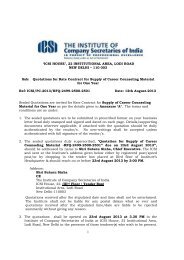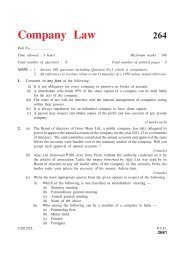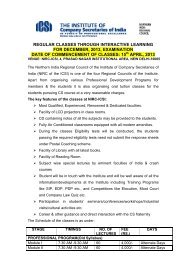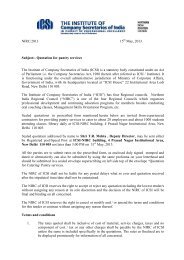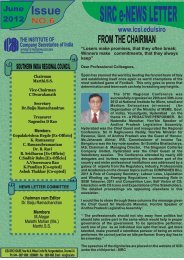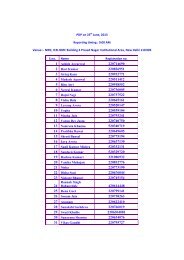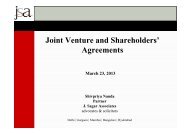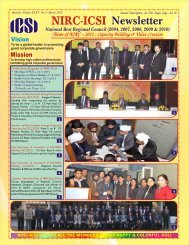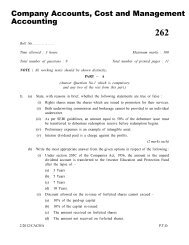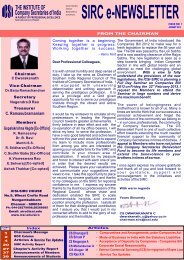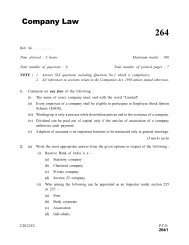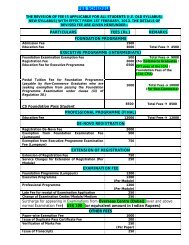Due Diligence For Transactions - Icsi
Due Diligence For Transactions - Icsi
Due Diligence For Transactions - Icsi
Create successful ePaper yourself
Turn your PDF publications into a flip-book with our unique Google optimized e-Paper software.
<strong>Due</strong> <strong>Diligence</strong><br />
<strong>For</strong> <strong>Transactions</strong><br />
1
Agenda<br />
• Introduction: Objective and Purpose<br />
• <strong>Due</strong> <strong>Diligence</strong> V Audit<br />
• Need of <strong>Due</strong> <strong>Diligence</strong><br />
• Scope of <strong>Due</strong> <strong>Diligence</strong><br />
• Approach<br />
• Report<br />
• Conclusion<br />
PwC 2
Introduction: ti Objectives<br />
Manage Risk<br />
Prevents Unpleasant Surprises<br />
Enabler in Negotiation<br />
Value Protection<br />
Facilitates Decision Making<br />
PwC 3
<strong>Due</strong> <strong>Diligence</strong> vs Audit<br />
<strong>Due</strong> <strong>Diligence</strong><br />
Audit<br />
Business Understanding to<br />
Purpose<br />
Report to shareholders/<br />
Investor<br />
Accounts users<br />
Prior to Transaction<br />
Timing<br />
Annual Closing<br />
Comfort / Transaction<br />
focussed<br />
Opinion/ Report<br />
True and Fair<br />
Industry Standards & Deal<br />
Drivers<br />
Governing Rule<br />
Companies Act / AS<br />
Effect on Transaction<br />
Drivers<br />
Effect<br />
Effect on Profitability / net<br />
assets / reporting /<br />
disclosures<br />
Controlled Access<br />
Access<br />
Full Access<br />
PwC 4
Purpose : Buy Side Vs Sell Side <strong>Due</strong> <strong>Diligence</strong><br />
Are you buying what you think you are buying<br />
Buy Side<br />
<strong>Due</strong> <strong>Diligence</strong><br />
Assist the buyer maximise<br />
his return on the deal<br />
Do you know the issues a potential buyer may negotiate<br />
on<br />
Sell Side<br />
<strong>Due</strong> <strong>Diligence</strong><br />
Assist the Vendor / Seller<br />
get the best value on the<br />
deal
SCOPE OF DUE DILIGENCE<br />
Scope of <strong>Due</strong> <strong>Diligence</strong> varies depending upon the kind of Transaction<br />
Unlike a statutory audit, there is no defined law / process by which the due<br />
diligence has to be conducted, it has evolved by practice and requirements of<br />
the transaction<br />
A. Typically, in a 100% acquisition i i of shares, Joint Ventures, Private Equity<br />
<strong>Transactions</strong>, the following is the scope of coverage of the due diligence<br />
exercise<br />
‣ Background and business overview of the target company<br />
‣ Constitutional Documents and Corporate Records<br />
‣ Share Capital – Clear title of shares to be acquired<br />
‣ Details of the directors, auditors and bankers<br />
‣ Corporate Governance<br />
‣ Details of Shareholders<br />
‣ Agreements and Contracts<br />
PwC 6
SCOPE OF DUE DILIGENCE<br />
Contd.<br />
‣ Licences and Approvals<br />
‣ Properties – Owned and Leased<br />
‣ Financial and Taxation records<br />
‣ Exchange Control (FEMA aspects)<br />
‣ Loans and Borrowings and Guarantees extended<br />
‣ Investments<br />
‣ Intellectual t l Properties<br />
‣ Litigations<br />
‣ Employees and Personnel<br />
‣ Insurance Coverage<br />
‣ Miscellaneous<br />
PwC 7
SCOPE OF DUE DILIGENCE<br />
B. In case of an Asset acquisition / Business / Undertaking acquisition<br />
Contd.<br />
In such acquisitions, iiti the focus is the on Asset(s) / Business /<br />
Undertaking to be acquired instead of the Company / its shares<br />
‣ Assets – their title and ownership<br />
‣ Encumbrances on the assets<br />
‣ Agreements and Contracts – related to assets<br />
‣ Approvals with respect to the use of the assets<br />
‣ Intellectual l Property<br />
‣ Litigation on the use and ownership of the assets<br />
‣ Employee Matters, Trade Union and Labour<br />
‣ Health, Safety and Environment Laws<br />
‣ Insurance Coverage on assets<br />
PwC 8
SCOPE OF DUE DILIGENCE<br />
C. Specific caution in case of due diligence of a listed company<br />
Contd.<br />
‣ Confidentiality Agreement / Non-Disclosure Agreement is executed with the<br />
parties involved in the transaction<br />
‣ Standstill provisions to be agreed with various parties – restricting them from<br />
dealing in shares of the listed company while in possession of unpublished price<br />
sensitive information<br />
‣ Generally, no disclosure to the stock exchanges when the due diligence is undertaken<br />
‣ Disclosure to stock exchanges when the transaction is finalised and executed<br />
‣ Dissemination of confidential information to the exchanges before closing the deal<br />
PwC 9
SCOPE OF DUE DILIGENCE<br />
D. FCA and Anti-Corruption Issues<br />
Contd.<br />
‣ Mostly required by MNC (US Companies) as significant portion of the due diligence<br />
‣ FCPA allows for payments (speed money / facilitation payment) made to government<br />
official for routine with requisite disclosures<br />
‣ Prevention of Corruption Act, 1988 is stringent in India and prescribe for imprisonment<br />
and penalties for offences committed under the law . Does not permit any form of<br />
payment, not even facilitation payment<br />
‣ These payments are difficult to track – they are mostly unrecorded<br />
‣ Even if tracked the reason for these payment informed that these payments are quite<br />
prevalent<br />
PwC 10
SCOPE OF DUE DILIGENCE<br />
E. Specific and Industry Focused Areas of <strong>Diligence</strong><br />
Contd.<br />
‣ Telecom<br />
‣ Information Technology<br />
‣ Export Oriented Units<br />
‣ Healthcare<br />
‣ Metals & Mining<br />
‣ Insurance<br />
PwC 11
PROCESS PRE-DUE DILIGENCE<br />
Step-1<br />
Agree with the Client on Scope and Timelines<br />
• Scope<br />
- Areas to be covered<br />
- Manner of maintenance and collection of data<br />
- Final work product<br />
• Timelines<br />
◦ <strong>Due</strong> <strong>Diligence</strong> Report<br />
◦ Only Executive Summary<br />
◦ Comprehensive Bible with Executive Summary, detailed report on all segments, data<br />
sheets<br />
- Time within which the exercise is to be complete<br />
PwC 12
PROCESS PRE-DUE DILIGENCE<br />
Step-2<br />
Getting Ready<br />
• Obtain copies of Information Memorandum, MOU, draft transaction documents, if<br />
any.<br />
• Draw up your wish list / checklist for circulation to Target and team<br />
• Circulate information, if any, about the transaction including available documents<br />
to the team, divideid upresponsibilities<br />
• Identify major issues concerning the transaction<br />
• Set out process and expectations<br />
PwC 13
PROCESS PRE-DUE DILIGENCE<br />
Step-2<br />
Getting Ready<br />
• Pick the members of the Team based on expertise required for the various<br />
components of the due diligence<br />
• Assess whether you need any outside consultant / expert for any aspect, e.g. labor<br />
related issues, real estate issues<br />
• Make sure that the consultant has the same level of transaction overview as the rest<br />
of the Team and understands the scope of his work clearly<br />
• In case a Non-Disclosure Agreement is to be executed by the client ensure that the<br />
consultant executes the same<br />
• Read all documents circulated relating to the transaction very carefully<br />
• Read up on industry and regulatory issues that may be relevant to the Transaction<br />
• Identify specific issues that may be relevant<br />
PwC 14
PROCESS PRE-DUE DILIGENCE<br />
Step-2<br />
Getting Ready<br />
Pre-diligence Deliberative Overview<br />
Prior to commencement of the process, an overview of issues considered to be of<br />
significance for the successful execution of the Transaction are normally deliberated<br />
upon between the Acquirer and Target representatives and their respective<br />
accountants and legal and business advisers<br />
This pre-diligence deliberative overview stage is of critical significance as it sets out the<br />
basis for setting out the scope and intensity of the due diligence process specific to the<br />
contemplated Transaction at hand<br />
PwC 15
PROCESS PRE-DUE DILIGENCE<br />
Step-2<br />
Getting Ready<br />
Components of the Deliberative Overview<br />
• Transaction Structure i.e. concerned parties, whether structured as share<br />
or asset purchase, tax considerations, restrictive covenants, etc.;<br />
• Transaction Funding i.e. how is funding contemplated and preliminary<br />
consideration of any significant issues in respect thereof;<br />
• Regulatory Issues such as restriction on foreign holding, subsidiaries,<br />
approvals, competition law issues and foreign exchange considerations;<br />
• International Aspects including the question of engaging overseas<br />
professional advisers;<br />
• Timelines i.e. determination of time schedules for various stages of the<br />
contemplated Transaction;<br />
• Confidentiality Agreements i.e. whether Target seeks powers to restrict the<br />
release of certain information or data and review of covenants in relation thereto<br />
(Particularly in a listed company);
PROCESS PRE-DUE DILIGENCE<br />
Step-2<br />
Getting Ready<br />
Components of the Deliberative Overview<br />
• Exclusivity or Lock-In Arrangements as per negotiations between the<br />
parties;<br />
• Data Room Guidelines regarding the due diligence process on Target entity;<br />
• Overall <strong>Due</strong> <strong>Diligence</strong> Strategy and consideration of the due diligence<br />
checklist as is usually circulated prior thereto; and<br />
• Specialized Issues such as industry-segment and relevant sector-specific<br />
issues including any specialized legislative requirements and such other details.
DUE DILIGENCE PROCESS<br />
Constituents of the Process<br />
• Two separate aspects of the due diligence process:<br />
– <strong>For</strong>mal Process<br />
<br />
<br />
Review and analysis of data provided in the form of documents<br />
Review and analysis based on interviews with representatives of the<br />
Target to get clarity on the missing links<br />
– Informal Process<br />
<br />
Significant information regarding the Target is obtained through<br />
discussions, i informal meetings with key persons of the Target
POST DUE DILIGENCE<br />
Preparation of the <strong>Due</strong> <strong>Diligence</strong> Report<br />
– Upon formal completion of the due diligence process, the due diligence Team usually<br />
finalizes the due diligence report<br />
– The due diligence report must seek to provide the most pertinent information at a<br />
given point in time in the most easily absorbed b form possible<br />
– It is particularly critical to relate the due diligence report to the strategic objectives of<br />
the due diligence process.<br />
– The due diligence report is to be shared inter se the Acquirer and its legal and<br />
business advisers<br />
l h h fi l i ll fi li d f ll d dili i i i<br />
– Although a final report is usually finalized after all due diligence investigations are<br />
completed however negotiation process benefits from frequent interim feedback<br />
especially in the context of any adverse factors coming to light
POST DUE DILIGENCE<br />
Constituent Sections of the <strong>Due</strong> <strong>Diligence</strong> Report<br />
• The due diligence report is usually prepared on the basis of terms of reference as<br />
as agreed with the client<br />
• The due diligence report would typically consist of the following three sections:<br />
– Executive Summary: This draws to the attention of the Acquirer, any items of<br />
concern or otherwise requiring attention and could usually start with the most critical<br />
points or deal breakers<br />
– Main Body: This would ideally follow the order and headings of the terms of<br />
reference or the checklist<br />
– Appendices: This section includes data sheets and/or documentation which are<br />
relevant to a critical issue
NOTE OF CONCLUSION<br />
• <strong>Due</strong> diligence enables negotiating team in a transaction to take on critical decisions<br />
pertaining to the said transaction<br />
• Accordingly, the process allows negotiating team to strategize the course of action and<br />
terms of negotiations going forward<br />
• Strategiest for Acquirer on the basis of findings of the due diligence process include the<br />
following:<br />
– Requiring certain adverse factors to be remedied prior to closing of the Transaction<br />
– Seeking specific representation and warranties and providing for indemnification<br />
thereof – due diligence is not an exception to the representation and warranties<br />
– Negotiating more favorable terms such as reduction in price, trade-offs against<br />
matters already conceded to Target, retention of part of purchase price to improve<br />
cash flow of Acquirer; and deferral of purchase price<br />
D i t i diti d t d diti b t t th<br />
– Drawing up certain conditions precedent and conditions subsequent to the<br />
transaction
NOTE OF CONCLUSION<br />
– Restructuring Transaction altogether for example from a share purchase to an<br />
asset acquisition<br />
– Obtaining financial guarantee from a more solvent third party as compared to the<br />
Target<br />
– “Walking away” from negotiations, i which h may be necessary where<br />
• There are adverse factors of such magnitude that adequate compensation or<br />
protection would not be feasible<br />
• The Acquirer does not trust the Target and has calculated that the maximum<br />
potential disadvantages are too high<br />
– <strong>Due</strong> diligence further identifies potential deal breakers enabling Acquirer to<br />
deliberate and focus upon the same during the course of negotiations<br />
– <strong>Due</strong> diligence additionally provides critical inputs on trustworthiness of Target
NOTE OF CONCLUSION<br />
– <strong>Due</strong> diligence most importantly allows Acquirer to determine whether proposed<br />
approach regarding Transaction fits within original strategic objectives of Acquirer<br />
– <strong>Due</strong> diligence constitutes a critical component of corporate transactions per se and<br />
the determinative basis of steps taken subsequent thereto for execution of such<br />
transactions.
NOTE OF CONCLUSION<br />
• Keeping in mind clearly the objectives of the transaction<br />
• Expectations of the Client<br />
• Cordial relation with the Target, its advisors and representatives<br />
• Excellent team work – follow the team leader<br />
• Adherence to the timelines<br />
• Professional etiquettes<br />
• Managing stress<br />
• Providing timely inputs to the negotiating team as and when required<br />
PwC 24
Section 6 – In Nutshell...<br />
On a lighter note...<br />
“Behind every great business deal is a <strong>Due</strong> <strong>Diligence</strong><br />
advisor advising against it“
Thank You for your attentiontio<br />
pankaj.tewari@in.pwc.com<br />
pwc com<br />
PwC 26



